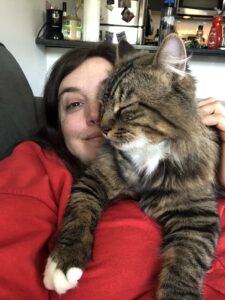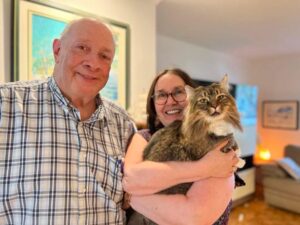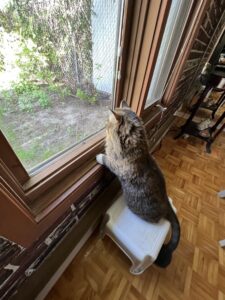There are special people in this world. People with big hearts willing to step up to give homeless animals with special needs a loving home and a second chance at the happiness they deserve. Caroline and her parents Raymond and Christine are three such people. And Gibson, a 6-year old kitty with Cerebella Hypoplasia (CH), is the latest lucky recipient of their love and kindness.

Gibson was found stray in Yarmouth in March last year. SPCA shelter staff noticed immediately that his head bobbled back and forth, so he was transported to Dartmouth for further veterinary examination. The poor boy had chipped and missing teeth, matted fur, a grade 2/6 heart murmur, and was also diagnosed with CH.
CH is a neurological condition in animals where the cerebellum of the brain doesn’t develop properly. It ranges in severity from a minor wobble in an animal’s walk to extreme difficulty moving around. Cats with CH require special families to adopt them who will be patient and understanding of their physical challenges. It was decided to place Gibson in foster care to assess his quality of life and what his ongoing needs would be. Some folks may not be up for this, but Caroline was.

Caroline explained “I received an email to foster Gibson, a cat with CH. I had already researched the condition and knew that CH kitties need their environment to be adapted to their abilities. I was confident I could give him the love and support he needed, and I had the time to take proper care of him. I worked for 9 years with disabled people as a student job, in the summer in a day camp with kids, and then in adult facilities. I’m not scared of the differences. SPCA staff thoroughly explained Gibson’s challenges and made sure I understood what would be involved in fostering him. When I met Gibson, it was ‘game over!’ I thought he was very handsome, with beautiful eyes and an innocent look. He was also surprisingly trusting, given the hard life he had been living. I knew I wanted to protect and care for this sweet boy.”

In fact, Caroline had previously adopted two special needs kitties. She related “Seven-year old Gregoire had severe asthma and I had to give him medication with an inhaler every day. Eleven-year old Scotia, who I fostered then adopted, suffered from arthritis and needed 2 different medications twice daily for life. Tragically, both of them died in the Halifax cat boarding facility fire in December 2021. My heart is still broken today.”
Caroline fell head-over-paws in love with Gibson while fostering him. He was so sweet and loving and so resilient,” she said. “But unfortunately, while my one-bedroom apartment was fine for a short time while fostering, it is too small for two active cats (I already had my cat Khiva). I wasn’t the only one who fell in love with Gibson though. I sent my parents in Quebec tons of photos and videos while I was fostering Gibson and they just knew in their hearts that they had to adopt him. They did so on May 22nd. I was thrilled that Gibson would stay in the family.”

Raymond and Christine have the biggest hearts when it comes to cats. “They already had two rescue cats – Rino and Bébé,” explained Caroline. Previously, they had a kitty with thyroid problems and needed to give him medication every day. They also feed 7-8 semi-feral cats outside in their backyard twice a day and have done so for several years. With the help of a neighbour, they built them huts to shelter the cats in the cold winters and even paid to get them all spayed and neutered!”

Christine shared “We made sure that Gibson would be safe and comfortable in his new home. Because of the CH, Gibson has less coordination than a normal cat and we adapted our house to his condition: small stools to look out the window, a small staircase to climb on the bed for his afternoon naps, and the addition of a large carpet in the living room for him so he can have more stability. We got big plates so he could grab his food easier even though his head wobbles. He has a litter box with sides that are not too high for him to step into. We also bought scratching pads that we put on the floor because he can’t scratch his claws on a vertical pad. There are several cat beds on the floor for him and his two fur-siblings that we put in different rooms.”
“Gibson has no fine motor skills, but he isn’t an extreme case of CH,” Raymond explained. “He walks slowly without falling but will fall if he tries to run. He is kind of shaky in the litter box but he has figured out his own technique! CH kitties are a bit clumsy when it comes to spilling food and litter on the floor, but we don’t mind at all cleaning up after him.”

Caroline and her parents were impressed with how quickly Gibson adapted to his new environment. “Interestingly, he was scared of my dad at first (we don’t know anything about men in his history),” reported Caroline. “But after a few days, Gibson knew he was safe with him and since then, my dad has become his favorite human! He follows my dad everywhere in the house and whenever my dad sits on the couch, Gibson paws him so my dad can hold him in his arms.”
Gibson is definitely living his best life. Christine shared “He enjoys napping with his two fur siblings and giving them grooming sessions. They now follow Gibson wherever he goes; he’s become the leader of ‘the three amigos’! He also has fun bird watching at our cottage in the woods. He looooooooves the cottage! He celebrated his first Christmas with us and we are looking forward to many more Christmases with him.”
Caroline summed up “Gibson is thriving and continues to fill the family’s hearts with love and joy. The three of us are so proud of him and how independent he is despite his condition. I see him several times during the year and he always remembers me and is happy to see me. It makes me feel good that I was able to play a role in Gibson’s happily-ever-after.”
The family encourages everyone to consider fostering or adopting a special needs pet. “They may need some extra time and patience, but they deserve a chance to show you how amazing they are. You’ll be rewarded by unconditional love and gratitude.”
Understanding the commitment involved in adopting a special needs pet is crucial to a happy healthy relationship. There are important things to consider before adopting a pet with special needs.
- Think about any long-term dietary requirements, special medications or treatments your pet will need. Pets with behavioral issues may need special training; those with mobility challenges may need therapy or surgery. Ensure you can fit these costs into your family’s budget.
- Your pet may need medications/injections at specific times of day. Ensure you’re available to do this.
- Talk with your family about the challenges that come with adopting a special needs pet and ensure everyone’s onboard.
- Your pet may need more frequent vet visits. Pets with an injury or physical disability may need assistance with standing or walking. Some may need you to physically accompany them outside for bathroom breaks, as opposed to simply being let out.
The Nova Scotia SPCA makes every effort to place special needs pets with their perfect human match. Before deciding to adopt, speak to shelter staff since they’re familiar with the animal and consult with your vet to get a good understanding of the pet’s ongoing requirements. Whatever the pet’s special needs, the SPCA will be there before and after adopting to support you by providing information and advice.
